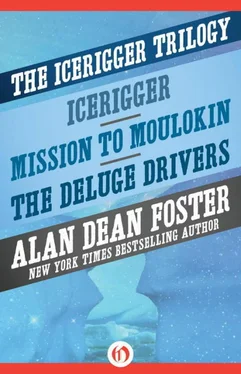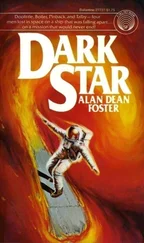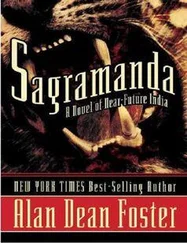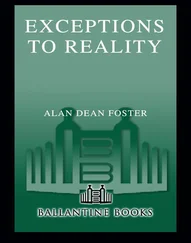Ethan couldn’t forestall a grin. “That’s crazy,
Milliken. It’s too cold here for the Saia now and if they built these cities, surely they’d remember. And it’s too desolate now for the Tran and, assuming the climate was warmer, too hot for them before.”
“That reasoning misses the point. It’s because…” Williams paused, took a preparatory breath. “It’s not simply a matter of its once being hot, now being cold here, Ethan. I think Tran-ky-ky has a perturbed orbit of predictable periodicity.”
“I hardly know what to say.”
“I’ll try to explain. Any competent astronomer would have noticed it after a week’s study, with the proper factual input. But the only astronomer to visit this outpost world was the initial survey drone which first located it. The Commonwealth government would be interested first in the fact that it was an inhabitable planet with a stable climate, flora, and fauna. Relatively long-term alterations will show up in the files on Tran-ky-ky, but there’s no reason to act on them until the next period begins.”
“ What next period?”
“Of warm weather. I’d estimate, very crudely, so many standard years of cold, followed by a briefer period of warm weather as it passes nearer its sun. Say, ten thousand years. The transition from cold weather to hot takes place comparatively rapidly, since as. Tran-ky-ky swings close by its star, its orbital velocity, would increase, slowing as it swings out into the cold zone again. It’s a peculiar situation and I’m not certain of the details or mechanics, but that’s what I believe takes place.
“Think what that would mean for this planet.” He spoke distantly, his gaze centered on events far away in time and place. “During the hot period the ice oceans melt, and rapidly. The sea level would rise to submerge island states such as Sofold and much of Arsudun. Sofold is in reality built atop a seamount, while the mountain-tops of Poyolavoniaar would become true islands.” Suddenly he dropped his gaze, looking embarrassed.
“That was what puzzled me so about Moulokin canyon.” Ethan thought back, recalling the teacher’s confusion over the canyon’s geology and his feeling of half-recognizing its source.
“It’s not a river canyon at all, though it resembles one closely. Rather, it’s a dry undersea canyon, the kind that slices through a continental shelf down to the edge of the abyssal plain flooring the ocean. The cliffs of the plateau we sailed alongside for so long are actually the old continental shelf. Now,” he said with satisfaction. “I’m ready to go digging for artifacts. But not in the cities. Right here, beneath the ship.”
“Wait a minute. What do you expect to find under the ship? And what did you mean when you said the Tran and the Saia both built the metropolis?”
“Tell you in a couple of days, young feller-me-lad,” he said, mimicking September.
It was two days, exactly. What the teacher uncovered were far less spectacular and much more important than any objects thus far uncovered in the buried structures.
He spread them out on a table in the central cabin, where human and Tran alike could see. “Look,” Williams began, “insect eggs over there.” He pointed to a pile of eddy-shaped, tiny white beads. “Try opening one. The casings are tough as stelamic. I had to use my beamer to assure myself of the contents.
“Animal eggs.” He pointed to some similar objects, only they were larger and multi-colored. “Seeds, I think.” He indicated a vast array of black and brown objects, mostly spherical. “Those I could barely singe with the beamer set for fine cut.
“When the temperature rises and the oceans melt, you’d have ample rainfall. In addition to enhancing an explosion of vegetation on land, such a drastic change would kill off the pika-pina and pika-pedan. Despite such changes, some plants have managed to survive the cold periods. Witness the yellow grass and occasional wire-brush we’ve passed these past days. Those grasses and the unknown varieties contained in these seeds take over the land. The pika-growth would retreat to the poles, waiting for cold epochs to return. We’ve seen how fast it grows. It could expand down from the poles, and perhaps from isolated surviving pockets on the shores, to become the dominant vegetable species in a very short time.
“I wish I had a decent laboratory here. These eggs… Somehow they survive thirty thousand years before the land warms and frees them. That’s important, because there are pretty disorganized people wandering around at that time, looking for food.
“The Golden Saia are not a different variety of Tran, nor are the Tran a species of Saia.” He gestured at Hunnar, at Elfa, at Ta-hoding. “You and the Saia are the same people.”
A mate made a disgusted noise.
“The Saia are the warm-weather mode of the Tran. During the onset of cold, those who survive the radical weather change develop thick fur. Wing dan appear and podal claws expand and grow to become chiv for traveling across the ice.” He sat down behind his table of living fossils.
“Think what such cataclysmic change would do to a developing but still primitive society. Famine, death from exposure, the near instant destruction of familiar food supplies. Sea travel obliterated, cutting off intercontinental and interisland communication. A drastic reduction in population—which explains the extent of these cities compared to the size of present Tran communities.
“It explains, Hunnar, why your people retain no memory of your warm weather ancestors. Survival would be more than enough to occupy every mobile minute of the dazed remnants of that hot climate civilization. How to make a fire, how to cook food, those would be the important things to hand down to shivering children. Not history. Given the frequency of the warm-cold weather cycle, you never have the chance to catch your racial breath.”
“No ice—free-flowing water for oceans?” Hunnar’s expression showed both horror and disbelief, as if someone had proved unequivocally that the world was flat.
“No ice,” said Ethan slowly. “And probably no real winds to speak of, either. Rain instead of snow and ice particles—-good-water-falling-from-the-sky,” he translated awkwardly, remembering that the Tran had no word for rain.
“No ice.” Hunnar seemed unable to pass beyond that incredible concept. “One could fall all the way through to the center of the world.”
“Water can support you, Hunnar, though not as well as ice.” Ethan forbore trying to describe what swimming was.
“The more reason for this confederation.” September brought them back to the present, back from speculations future and past. “If this information can be conveyed back to a few Commonwealth bureaucrats in the right agencies, it could mean a change so big and important here that—well, I can’t put into words what it would mean to your people, Hunnar.
“More o’ less, it’d mean that the next time your world warms up and you develop a nice, burgeoning society, get yourselves growing good and proper, then when it turns cold again, Commonwealth technology will be there to help you cope. Assumin’ the Commonwealth stands. I don’t make predictions for any government. They’ve got a disconcertin’ way o’ self-destructing.
“And you’d be able to develop a true planetary society for the first time, gain a continuity of racial development and history your world’s knocked down every time its gotten started.
“But it won’t do anybody any good unless we get this knowledge to Commonwealth authorities and show them there’s a world here cryin’ out for associate status and some honest recognition.”
IT WAS SEVERAL DAYS before they broke into the Assembly. The impressive domed chamber was buried beneath a huge slide. That unstable ground made Ethan and several others reluctant to enter, despite the apparent stability of the intact ceiling. Williams and Eer-Meesach could not be restrained, however. They were followed by others, reluctantly, into the largest enclosed space they’d found on Tran-ky-ky.
Читать дальше










